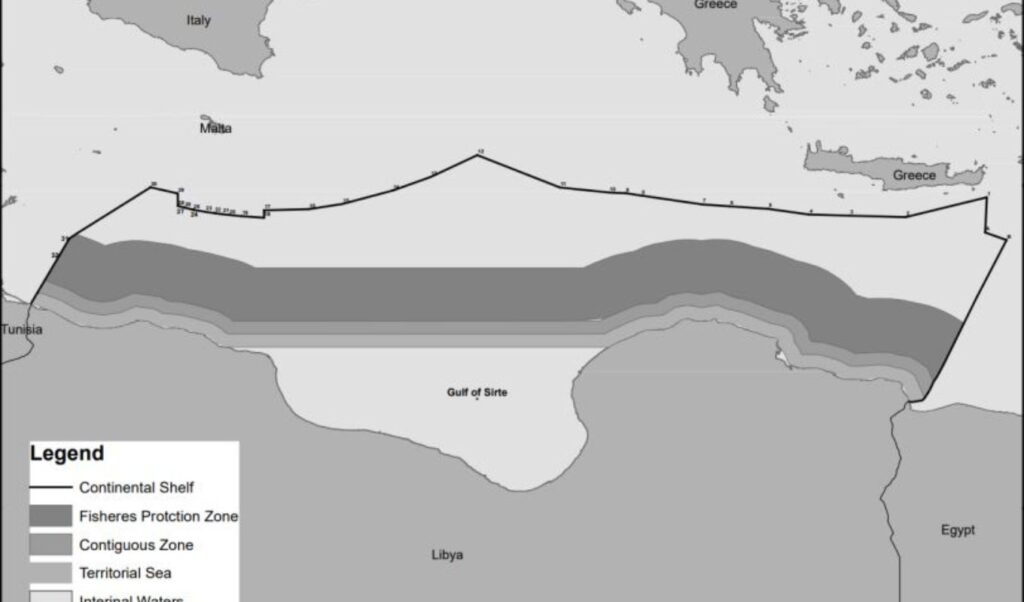The latest provocative actions by Libya against our country, which inspire concern, have different interpretations—geopolitical, diplomatic, or economic—depending on the perspective one wishes to view them from. However, a common understanding is that the main catalyst in developments regarding Libya’s reactions is the interest shown by American energy giants, particularly Chevron, in exploration of maritime blocks south of Crete.
Parapolitika.gr reached out to Professor of Turkish Studies at the University of Athens, Alexandros Despotopoulos, to clarify the geopolitical game at our country’s southern borders. Professor Despotopoulos sees behind Libya’s theatrical moves the game of Turkey with maritime zones in the Mediterranean, with the motive of preventing major energy giants from investing in our country.
“What I see is that Turkey is primarily reacting. Libya at this moment is a corrupt, dissolved state that essentially functions as Turkey’s mouthpiece in the region. Turkey, and secondarily Libya, have been disturbed because they see Greece’s energy plans advancing in the area covered by the Turkish-Libyan Memorandum. And they are mainly disturbed because the concession of blocks ‘Crete 1’ and ‘Crete 2’ to Chevron is proceeding. Turkey is also worried about Chevron because, along with other companies, they have expressed interest in blocks on the Libyan side of the Maritime Zones, where they actually belong to Libya, and it worries that the Turkish oil company might be left out if these companies return to the game based on a tender that started in 2007 under Gaddafi. Nevertheless, in 2023 this process had been revitalized.
Turkey sees this and tried to react through illegal means, obviously, with the Turkish-Libyan memorandum. It sees that its Mediterranean plans are collapsing due to Chevron on the Greek side, but there is also fear that they might collapse on the Libyan side due to American and other companies showing interest in Libya’s deposits. There’s also Exxon Mobil, BP, and French Total. So it fears that its illegality isn’t working out. That’s why it has this intense reaction with Verbal Notes, map postings, protests, and to avoid appearing itself, it puts Libya forward.”
Despotopoulos to parapolitika.gr: Libya appears not to seek definitive rupture with Greece
Professor Despotopoulos believes that Libya’s appeal to the UN with Verbal Notes produces no legal effect and only serves Turkish aspirations. However, as he argues, Libya appears not to seek definitive rupture with Greece.
“The Verbal Note to the UN produces no legal effects. Verbal, as the word says, is a communication of oral character, written but unsigned that explains one side’s position. Since it is based on an illegal memorandum and an illegal continental shelf proclamation anyway, it has no legal foundation. A Verbal Note has no legal foundation anyway. It’s something a state sends to the UN, makes a statement and this is recorded as a statement in the records. The fact that it’s filed with the United Nations doesn’t mean the UN adopts it. It simply records it. A state goes and records it. They told us nothing new. They are faithful to the Turkish-Libyan Memorandum, they are faithful to what they consider their own continental shelf. For the Exclusive Economic Zone, another Verbal Note had preceded. Turkey’s long arm is evident. The Blue Homeland logic has logic in Libya too, which has taken it and made it a flag to claim something more for itself. Because at this moment we don’t have a normal situation in Libya. We have a government that relies heavily on Turkey both economically and practically. With weapons and the rest.
Despite all this, however, Libya is careful in the concession of blocks it makes. Because it doesn’t want to completely break things with Greece. That is, with Europe. Whatever blocks it concedes at this moment or discusses are below the so-called median line which, based on international law, is what Libya should take as the limit of its rights. So in reality, while at the level of diplomacy, Verbal Notes and the rest, regarding its claims, it hasn’t gone to the field to implement them. It shows to be more careful there.”
“We have international law on our side, but we must transform it into partnerships and alliances”
Regarding Athens’ reaction, Professor Despotopoulos argues that the problem is not Libya’s moves, but Turkey’s. “Diplomatically, the Note will be answered, as all notes are answered. We will also make a response which we will submit to the UN. It’s the usual diplomatic practice anyway. What is important for us to do in the coming period is to continue creating interests. That is, the presence of Chevron but also ExxonMobil in the Peloponnese is a very good shield for us.
We should worry if we see Turkey trying through Libya to stretch things. To see some Turkish vessel being licensed by Libya to conduct research at the same time Chevron comes. To go harass it, supposedly to help Libya. Of course, I don’t consider it very likely because Turkey didn’t do it in Cyprus, that is, it didn’t bother the Americans unlike with Total and French and Italian companies. It didn’t go bother the Americans because it knows very well that American companies don’t play with such things. So we should rely on that. We have international law on our side, but we must transform it into partnerships and alliances. It’s the best shield we can make in practice, in the field. Not just writing, that is.”




